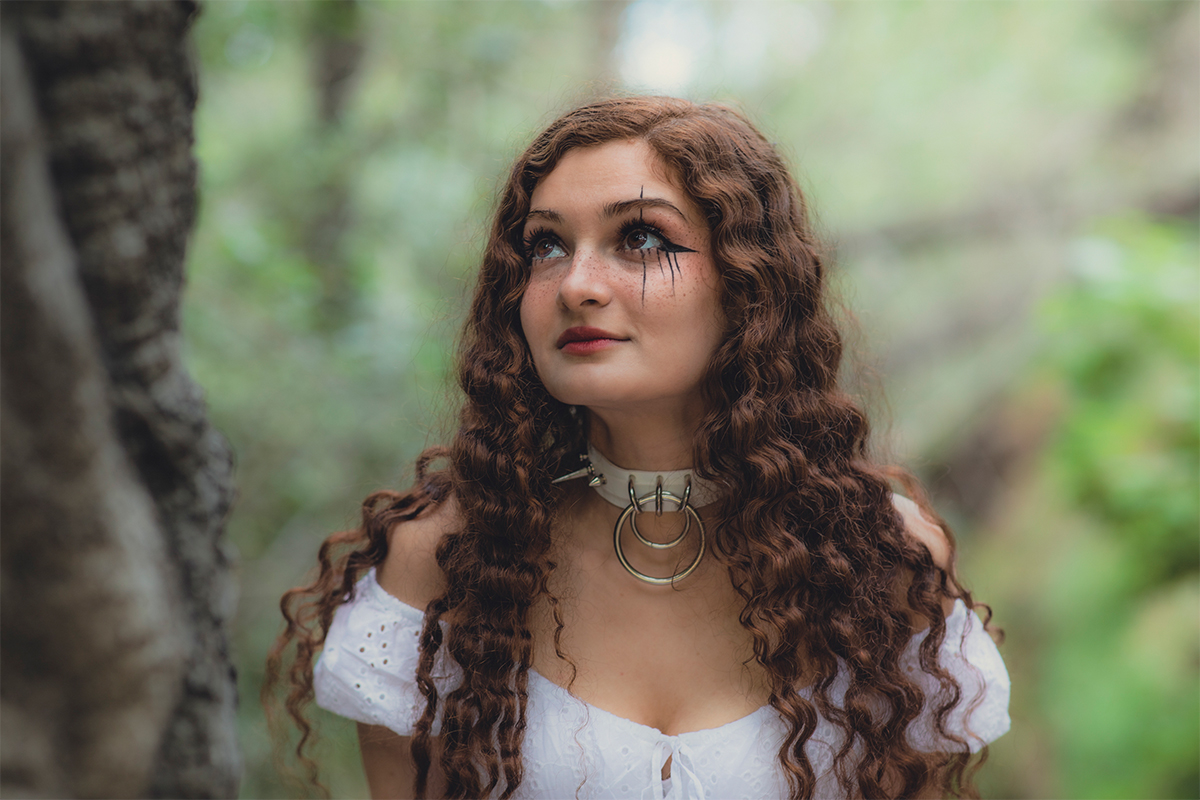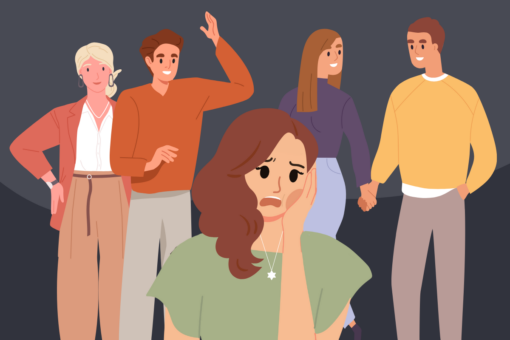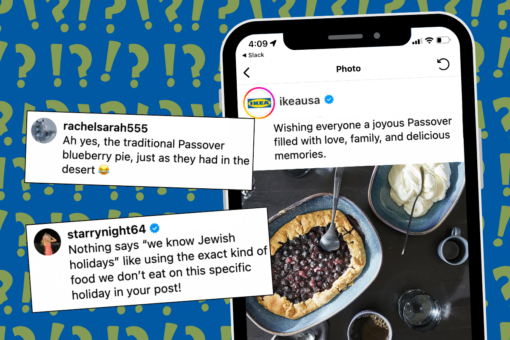Banshee, a Jewish self-produced and self-described “fairy metal” musician, has been on the rise since the onset of the COVID-19 pandemic. Since then, her music has gained notoriety on Spotify and TikTok and has attracted what Banshee describes as a “safe” community of “Stanchees” — including Jewish, queer and non-cis listeners — who might not feel welcome in the mainstream metal community. Banshee’s lyrical range is sweeping: She discusses her experiences with abuse, reclaims her own artistic power and even utters a Jewish curse in one of her latest songs.
On the release day of her album, “Fairy Metal,” Banshee spoke to Hey Alma about the relationship between her artistry and her Judaism.
This interview has been lightly edited and condensed for clarity.
Who is Banshee, and how would you describe her sound?
I produce my own music and do my own vocals; I do everything in my room and on my laptop. Describing my sound is a little bit hard, but it’s very electronic-influenced mixed with witch house, metal, and hip-hop. It’s basically just everything I’ve ever loved over my entire life mashed into one. That’s the best way to explain it.
My music also goes through different phases constantly, just like phases of the moon. I started out playing guitar and playing in bands. Then, I got really into emo music, then metal, and then I dropped everything to produce electronic and metal music. Right now, I just put out a metal album, but last year, the music that I was making leaned more towards electronic and witch house.
When and how did you start making music?
My entire life, I’ve really loved music. I always wanted to be Avril Lavigne or in Green Day. I started playing guitar when I was 8, and I knew immediately that I wanted to go to music school. I had wanted to do music for a living, but I hadn’t thought that I could, because I was young, and at that time, streaming wasn’t a thing yet. It wasn’t until recently that small musicians could actually make a living, so I didn’t think it would be possible. I began aiming to do more technical work, like working in a studio. But then everything changed.
How did everything change? Was there an inciting incident, or was building your following a slow and consistent process?
It was around the time that the pandemic started, actually! It was really good timing: I had left my old job because they hadn’t really been taking the pandemic too seriously. I was kind of just like, “I’m out; I’ll figure it out.” At the time, TikTok was really starting to pop off, and I just clicked — I got really lucky. I had some videos that did well, and things just snowballed from there — just from posting on TikTok and connecting with the people who were on there.
@bansheebby the original sound got removed bc of a glitch 💔 I hope the Jewish metalheads find this again #metal #metalhead #deathmetal #blackmetal #egirl #alt #altgirl #alttiktok #survivor #metalgirl #fairymetal #heavymetal #metalheads #metaltiktok
What role has Judaism played in your life over time?
My two younger brothers and I all had b’nei mitzvahs, and we all went to a conservative Jewish day school. I went to summer camp for four years. I grew up somewhat religious, but I never was super tied to the religious part of it. I always really liked the culture and the traditions and the family aspect, and how, literally anywhere you go in the world, you can meet family. That, to me, was always what really stuck with me about Judaism.
What role does Judaism play in your music?
My melodies are so influenced by the music from my Jewish day school. We prayed every morning, and the melodies still live in my head. A lot of the melodies are in minor keys and harmonic minor. I literally think in those scales. They have had more of an influence on my music than I can articulate — almost just as much as the music I’ve listened to since, which is so interesting. When you grow up on that music, it really doesn’t leave you.
What is it like navigating the world of metal, which is so heavily dominated with cisgender, heterosexual men, as a young, queer artist?
I don’t f*ck with Nazis; if you listen to or work with artists that support that stuff, I don’t f*ck with you. I want to bring more women and queer people into the scene because I know there’s so many that love metal but are afraid to go to shows — they DM me and tell me that—and I just want to make it safer for them.
Other than that, I just honestly just do my own thing. I kind of just ignore everything and do what I want to do. I like what I like, I’m here to do what I want to do, and I don’t really care if men in cargo shorts don’t like it. It is a little bit scary, though, because there is so much racism and antisemitism in the scene. It’s really gross. I’ve tried to just align myself with the good people as much as possible and make my message as clear as possible.
Congratulations on releasing “Fairy Metal”! Tell me about it?
“Fairy Metal” was me coming back to metal. I was in a very, very abusive relationship when I was first a metalhead, and I got very tied into the scene. When I left that relationship, I had to leave the scene. Metal became extremely triggering for me. I couldn’t listen to it for years. But when my music started popping off, I started getting back into the things that I love. This album is just me being like, “Hey, I love metal. I’m back.”
What is your favorite track on the album?
The title track: “Fairy Metal.” Younger me would just be so proud of it. I also used the Jewish insult or curse, “erased shall be his name and memory.” I loved sneaking that into it. It makes the song mean a lot to me.
It sounds like you have a lot of exciting things on the horizon. What has been the most surprising thing that you’ve learned during these past two years?
It’s amazing that there are so many Jewish metalheads. It’s such a specific niche — there aren’t many of us Jews, and there aren’t that many metalheads, so the amount of crossover is so cool. It also just makes me feel so safe. During my first show, I had a couple of people come up to me and say “You know, I’m Jewish. It’s so cool that you’re openly Jewish.” It felt so amazing.



